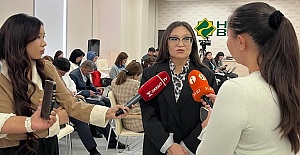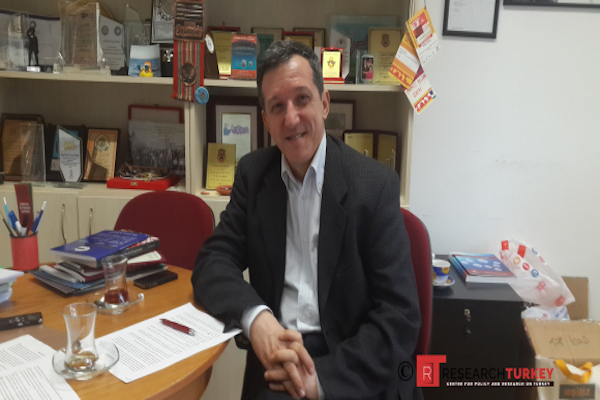Centre for Policy and Research on Turkey (Research Turkey) conducted a long interview with Professor Erinç Yeldan about economic dynamics of Turkey. Recently, there have been some discussions between the government authorities of Adalet ve Kalkınma Partisi (Justice and Development Party) (AKP) and the executives of Central Bank, especially on the issue of determining the interest rates. The Turkish Lira has depreciated considerably under the influence of the domestic dynamics and global conjuncture. We examined the underlying reasons for the current problems with Professor Yeldan. Firstly, we discussed the model of speculative growth and also the Central Bank’s price policy. Moreover, we discussed the structural problems of Turkey’s economy in detail, and specifically talked about the negative impacts of regional inequalities in Turkey on investors. In this discussion, we had to tackle the solutions vis-à-vis unemployment, the principal problem of regional inequality in Turkey. We then moved from the context of Turkey to Greece, and talked about the policies of Syriza party that won the latest elections and finalised our interview with the developments in the Middle East.

Professor Erinç Yeldan graduated from the Department of Economics at Boğaziçi University. After completing his doctoral degree at the University of Minnesota in 1988, he became a member of Bilkent University. He received his associated professorship degree in 1990 and professor’s degree in 1998 from the same university. He worked as a visiting professor at the University of Massachusetts Amherst. Professor Yeldan currently works in the Department of Economics at Bilkent University and his research is on international economics, applied general equilibrium, and macroeconomic models. Erinç Yeldan, who has numerous studies and articles in the Turkish and international economic literature, is the author of the book entitled “Turkish Economy in the Globalisation Process” (İletişim Publishing, 2001), and contributed to a large number of books as co-author. Yeldan received Science Encouragement Award (1998) from the Türkiye Bilimler Akademisi (Turkish Academy of Sciences) (TÜBA) and is a founding member of the research group called the Association of the Independent Social Scientists.

Interview Summary
“Turkey’s transformation in the 1980s that was marked by a process of leaving the capital flows of Turkish economy totally uncontrolled, has created very liberal, uncontrollable and completely outward-oriented economic conditions.” “Moreover, the turbulences of 1990s and the crisis of 2001 were a result of the uncontrolled financial liberalisation, and the lack of regulatory authorities and financial infrastructure.” “In recent history, during the period of Adalet ve Kalkınma Partisi (Justice and Development Party) (AKP) governments, Turkey’s growth performance was determined completely by speculative capital inflows and outflows in the years of 2003 and 2008, and until the days in which the crises of 2008 hit Turkey.” “This process creates good results if there are capital inflows from abroad, but when the pace of capital inflows slows down –especially as a result of a political tension– this process creates negative results.” “Furthermore, there are some decisions taken by the U.S. FED that will influence the global financial markets. Especially, in those decisions there is an expectation of the rise in interest rates under the auspices of the FED.”

“Turkish economy became obliged to give much more severe responses to these speculative ebbs and flows due to some structural conditions such as higher level of unemployment, lower level of investment performance, and relatively higher level of inflation.” “The disaccord between AKP government and the Central Bank, let’s say, cannot be considered solely based on today’s conjuncture in terms of monetary policy.” “Firstly, as a reflection of Turkey’s accumulated structural problems, these intense fluctuations in the exchange rates lie behind the newly emerged negative balance between current account deficit and growth.” “Secondly, there are some interventions in the political variables of the Central Bank –as an independent, autonomous institution– for assuring price stability and financial stability.” “As the tensions arising from Turkey’s domestic politics rose to the surface in addition to the structural conditions, Turkey and Brazil became the most disadvantaged economies due to the stagnation in the real economic growth rate.” “Imagine a line from Zonguldak to Hatay and two parts such as Eastern Turkey and Western Turkey: On the one hand there is a picture of Turkey fallen into the poverty trap, on the other hand, there is another picture of Turkey stuck in the middle-income trap in which important industrial investments are realised, but it makes Turkey a centre of excellence in limited fields.” “If the government takes the lead in housing constructions based on unearned incomes by the means of the Toplu Konut İdaresi (Housing Development Administration) TOKİ in Turkey, it also creates a real estate bubble stemmed from those unearned incomes. However, it does not make Turkey a centre of technology design in Eurasia beyond the middle-income trap.” “The most recent example of the crisis based on the housing bubble is Spain. A little earlier example is Malaysia and Thailand geography before the Asian crisis of 1997.” “A growth model which is carried out through housing speculation based on low-cost labour might create a growth just before the elections, but when its resources become exhausted, it collapses like a house of cards.” “This gap between Eastern and Western Turkey retards or prevents realisation of some effects such as spill over and externalities resulted from a foreign capital investment. Therefore, the first intervention for overcoming this obstacle is eliminating regional unemployment in Turkey.” “Eliminating regional unemployment proposes that Turkey seems to need a diversified educational perception which does not only refer to those people with a higher education, but also vocational education and training qualified staff.” “Turkey should form an energy pattern heavily stemming from solar and wind energy sources. As we always talk about, this can be realised by improving investments for agriculture and innovation.” “Greece or any other country cannot reach the growth point by using the formula of ‘Once you have surplus in the budget, and then move to growth stage.’ This practice can only coexist with growth and social gains.” “I think that the political focal point of the Middle East region and North African countries will be maintained through not oil, but violence and arms economy.”
This publication as follows:
Research Turkey (June, 2015), “Interview with Professor Erinç Yeldan: Understanding Current Economic Discussions in Turkey: Assessment of the Turkey’s Turbulent Year Series – III”,Vol. IV, Issue 6, pp.34-59, Centre for Policy Analysis and Research on Turkey (Research Turkey), London, ResearchTurkey. (http://researchturkey.org/?p=9024)


 After Nesil Caliskan a by-election will be held in Jubilee ward in Enfield
After Nesil Caliskan a by-election will be held in Jubilee ward in Enfield Publishing the analysis, Labour’s Cllr Ergin Erbil said Everybody in Enfield deserves basic rights
Publishing the analysis, Labour’s Cllr Ergin Erbil said Everybody in Enfield deserves basic rights Gaza-Israel conflict Statement from Cllr Ergin Erbil, Leader of Enfield Council
Gaza-Israel conflict Statement from Cllr Ergin Erbil, Leader of Enfield Council Cllr Ergin Erbil was elected as the new Leader of Enfield Council
Cllr Ergin Erbil was elected as the new Leader of Enfield Council The International Turkic World Journalists Media Forum will be held in Almaty
The International Turkic World Journalists Media Forum will be held in Almaty GastroANTEP, A FESTIVAL OF ABUNDANCE, FRATERNITY, LOVE, AND AFFECTION
GastroANTEP, A FESTIVAL OF ABUNDANCE, FRATERNITY, LOVE, AND AFFECTION Scientists from the al-Farabi KazNU have developed an online course for a mobile application
Scientists from the al-Farabi KazNU have developed an online course for a mobile application Murder probe launched after 4 killed in UK house fire
Murder probe launched after 4 killed in UK house fire Fenerbahce vs Manchester United Predicted line-ups! Jose Mourinho faces former side
Fenerbahce vs Manchester United Predicted line-ups! Jose Mourinho faces former side London’s Cycleway network expands to cover more than 400km
London’s Cycleway network expands to cover more than 400km Unity EURO Cup champions inclusion and diversity through football
Unity EURO Cup champions inclusion and diversity through football A new tennis operator to Enfield - Georgians Tennis in the Parks
A new tennis operator to Enfield - Georgians Tennis in the Parks PRICE OF THE AVERAGE HOUSE INCREASES IN 2024
PRICE OF THE AVERAGE HOUSE INCREASES IN 2024 NEW RULES SERVICE CHARGE AND TIPS IN UK
NEW RULES SERVICE CHARGE AND TIPS IN UK The Southeast Anatolian Textile and Raw Materials Exporters’ Association has once again set a record
The Southeast Anatolian Textile and Raw Materials Exporters’ Association has once again set a record EU house prices up year-on-year in Q2
EU house prices up year-on-year in Q2
















